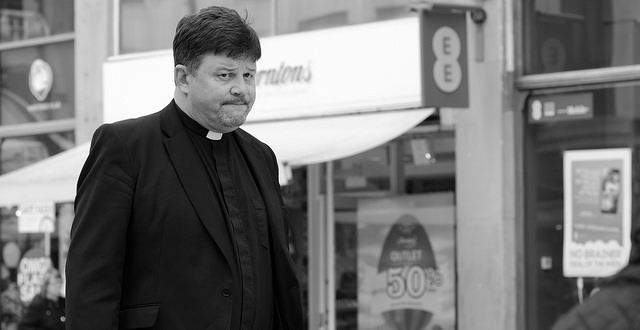The dilemmas of the Scottish independence referendum for a unionist and secularist democrat
Strong secularist and unionist Norman Bonney explains how he is tempted to vote ‘yes’ for an independent Scotland to liberate himself from a system that allows Church of England bishops in the House of Lords to contribute to the making of laws not only for England but also for Scotland and the rest of the UK. But on the other hand will the proposed interim constitution of an independent Scotland place too much power in central hands?
I am a secularist who is a director of the National Secular Society and Honorary President of the Edinburgh Secular Society. I work with others to achieve the separation of church and state and remove religious privilege, both in UK and Scotland.
One of the features of the current UK constitutional arrangements that offends me most deeply is the placement of 26 bishops of the Church of England (the state church) in the House of Lords where they contribute to the making of legislation for the whole of the UK and to the holding of the UK Government to account. In 2010 their votes were decisive in giving religious organisations some exemptions from the provisions of the Equality Act of that year.
I am tempted to vote ‘yes’ in the forthcoming independence referendum question ‘Should Scotland be an independent country? because Scotland would thus be liberated from thraldom to this unelected theocratic elite. I am surprised that bishops and politicians south of the border who want to preserve the union are so short-sighted that they have not thought of ending this archaic arrangement – the continuation of which only strengthens the case of those seeking the separation of Scotland as an independent country. But the only efforts being expended on the issue seem to be possible attempts to introduce female bishops to the bench – as though this would make these arrangements any more acceptable beyond the borders of England – a case of re-arranging the deckchairs on the Titanic if I ever heard of one!
But my dilemma is even more complex. While advocates of Scottish independence say that a ‘yes’ vote would in one fell swoop remove in Scotland the sway of the antiquated patronage-fuelled unelected House of Lords with its complement of clerics there is still great uncertainty as the shorter term and longer term constitution of an independent Scotland that would replace the current UK one if there is a ‘yes’ vote.
The centralisation of power in a new Scotland
The Scottish Government has an official timetable which would see, after a ‘yes’ vote, negotiations concluding in time for independence to be achieved by March 2016, followed by elections to the Scottish Parliament in May 2016. That new Parliament would have an obligation under the terms of independence to convene a constitutional convention to prepare a constitution for the newly independent state.
Such a scenario has built in optimistic timescales. But whatever the timescale, an independent Scotland would, for at least several years until a new constitution was agreed, have an all-powerful single chamber Parliament. And as is quite likely, and intrinsic to the policy programme embedded in the Scottish Government’s plan, Scotland’s Future, there would be a continuing Scottish National Party majority in that Parliament.
Like many African and Asian countries that came to independence in the 1960s and 1970s the achievement of independence would thus result in an unparalleled accumulation of power in the hands of the dominant nationalist party and, in this case, Alex Salmond or his successor and the Scottish cabinet.
An interim constitution?
Perhaps to counter such concerns work is going on behind the scenes without public consultation and under the supervision of the Scottish Government to construct a provisional interim constitution for the period until the new constitution comes into effect. Details of a draft Scottish Independence Bill will be presented to the Scottish Parliament shortly before the summer parliamentary recess at the end of June.
Key among the issues these ‘temporary’ interim arrangements will need to address is whether, in an immediately independent Scotland in the few years before the new constitution is approved, the single chamber Scottish Parliament will continue to be all powerful and unchecked by any other house. At present there is no ‘upper’ house. The House of Lords already has no role with respect to the unicameral Scottish Parliament.
To allay fears about the accumulation of such concentrations of power the forthcoming interim constitutional proposals may include some suggestions such as an elected Senate, as has been suggested by former Scottish Parliament Presiding Officer Lord David Steel. Alternatively there may be a proposal for a non-elected chamber of representatives of a diversity of social interests. Clearly an elected chamber would be the superior solution but an appointed chamber could accommodate those Scots of all political backgrounds that Alex Salmond has said he would like to see in a ‘Team Scotland’ to negotiate the actual terms of independence. And an appointed chamber would allow the religious denominations to have the recognition that they desperately crave in a new constitution. There could be a religious bench representing the diverse denominations that contribute to the Scottish Parliament’s weekly Time for Reflection. This would enable Scotland to score points compared to the single denomination that is represented in the House of Lords.
At this late stage this is still speculation and electors in Scotland thus still lack essential information as to the constitutional structure of an independent Scotland about which they are called to vote in just over three months’ time.
I await the details of the interim constitutional proposals but even then like most other electors in the referendum I may find that there is inadequate opportunity for the public and politicians thoroughly to comprehend and the debate the significance of measures that ultimately, despite their ostensibly temporary character, may shape the final character of the constitution that may eventually be approved by 2020 or after.
—
Note: this post represents the views of the author and not those of Democratic Audit or the LSE. Please read our comments policy before posting. The shortened URL for this post is: https://buff.ly/1k1iNRV
—
 Norman Bonney is emeritus professor at Edinburgh Napier University and Honorary President, Edinburgh Secular Society. His book ‘Monarchy, Religion and the State; civil religion in UK, Canada, Australia and the Commonwealth’ is published by Manchester University Press.
Norman Bonney is emeritus professor at Edinburgh Napier University and Honorary President, Edinburgh Secular Society. His book ‘Monarchy, Religion and the State; civil religion in UK, Canada, Australia and the Commonwealth’ is published by Manchester University Press.






 Democratic Audit's core funding is provided by the Joseph Rowntree Charitable Trust. Additional funding is provided by the London School of Economics.
Democratic Audit's core funding is provided by the Joseph Rowntree Charitable Trust. Additional funding is provided by the London School of Economics.
Interim constitution concerns. The dilemmas of the Scottish referendum for a unionist and secularist democrat https://t.co/wicwzdLVOl
dilemmas of Scottish independence #referendum for a unionist & #secularist democrat – #indyref https://t.co/WHdENNvT6z
The Scottish Secular Society were in the news some weeks ago pledging support for Scottish independence. Indeed, an expert on constitutions, Dr Elliot Bulmer sits on the SSS board and is keen to see a secular constitution. I hope the ESS will now join us in our campaigns. After all… better together, eh, Mr Bonney?
If you think YOUR dilemmas are complex, spare a thought for Norman Bonney.
https://t.co/ObJ4McPrQb https://t.co/wyLiqSiQdV
Still so much unknown and concerning about consequences of #indyref ‘yes’ https://t.co/2G0ebvrUkF
#indyref ‘yes’ would remove House of Lords bishops but would single Scots Plmt chamber be too powerful? https://t.co/k0zN400HiM #secularism
A good addressing of the centralisation issue in any independent Scotland’s constitutional arrangements. The SNP in the devolved Scottish Government role has shown a strong tendency towards centralisation across public services. (A process that was begun, it is now being forgotten, under the Labour-led Scottish Executive). The impoverishment of the health and vigour of participative local government and civic affairs does not bode well for popular countervailing pressures on centralised institutions (again this impoverishment was a process long emerging under successive Labour Administrations and the ‘clientelism’ long employed in managing Scotland).
A careful reading of this article, for me, suggests a possible other factor – one in favour of independence. That is the possibility of the popular electorate actually being able to require, support and participate in significant constitutional change. IMO it can be reasonable argued that the UK is not longer ‘fit for purpose’ and is failing. Like many institutions and entities that are failing, it seems incapable of learning and adaptation. Many, many, of us can claim to have been actively warning for a decade and more that the UK political system was heading into the situation that has now produced UKIP as a contender. UKIP, however, is not likely to do anything other than either gradually fall into the Westminster-metro-London embrace or – more likely – splinter and fall apart under its own contradictions and lack of substance.
In short, there is very little, if any, prospect of achieving meaningful progressive change within the UK for the foreseeable future. A new and re-arranged independent Scotland may seem to offer far more of a prospect of securing further change after a Referendum ‘Yes’ outcome. Much depends, as Norman Bonney has figured, on the form, shape and content of the interim constitutional proposals.
The dilemmas of the Scottish independence referendum for a unionist and secularist democrat https://t.co/TXIixLCOTE
The dilemmas of the Scottish independence referendum for a unionist and secularist democrat https://t.co/ATSxJsLyh7